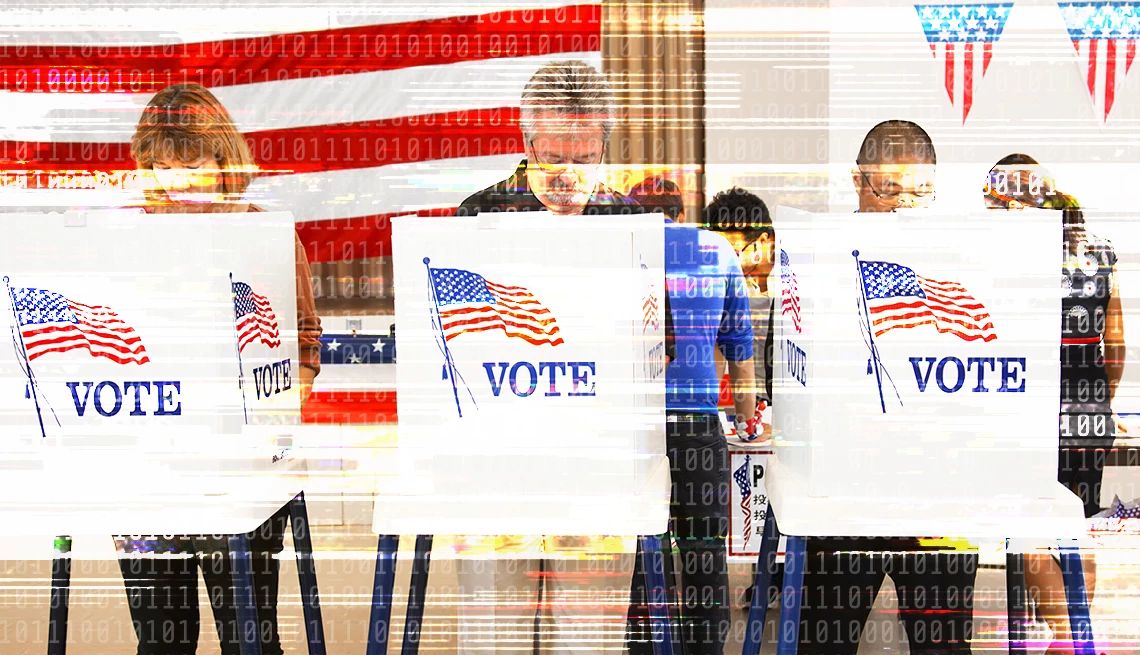AARP Hearing Center


Election Day is less than two months away, and this is the first election cycle in which artificial intelligence is widely available. That means regardless of whom voters support, they must work even harder to weed out false and misleading information before casting a ballot, experts told listeners to an AARP tele-town hall Thursday afternoon.
Artificial intelligence tools that can clone someone’s voice or generate convincing videos can make it difficult for voters to figure out what is and isn’t real. AI-generated “deepfakes” can be used to embarrass a candidate, cast doubt on the conduct of an election or confuse people about when or where to vote, said Alexandra Reeve Givens, president and CEO of the Center for Democracy & Technology, which tracks election disinformation.
She pointed to the example this year of an AI-generated robocall impersonating President Joe Biden, which urged registered Democratic voters not to participate in New Hampshire’s primary election. During an election in Slovakia this year, a deepfake audio recording made it appear as though a candidate planned to stuff ballot boxes, she said.
“We’re at a time in our country where there’s quite a lot of doubt around the conduct of elections, and there are some people who are actively trying to sow distrust in our public elections and their infrastructure,” she said. “So I worry a lot about those types of fakes continuing to undermine public trust.”
Learn How AARP is Fighting for You
AARP is your fierce defender on the issues that matter to people 50-plus. Read more about how we fight for you every day in Congress and across the country.
Tim Harper, the center’s senior policy analyst for elections and democracy, said people can spread misinformation unintentionally when they share it on their social media platforms, not knowing it is false or misleading.
Online platforms such as OpenAI (the start-up that created ChatGPT) and Meta (the parent company of Facebook) have warned about operations with ties to foreign governments that use AI to create fake social media accounts — and populate them with a large number of posts and reactions — with a goal of shaping public opinion on political issues in the U.S., Harper explained.
He warned about the potential for bad actors to send fake text messages to large numbers of voters using publicly available precinct information with the help of AI, in an effort to keep people from voting.
The message may say something like “FYI, voting at Peace Auditorium is paused due to fire sprinklers,” he said. “That might be more persuasive to the average person because ... they do in fact vote at Peace Auditorium.”
Join Our Fight For Accessible Voting
Sign up to become an AARP activist on voting and other issues important to people 50 and older.
Voters can best protect themselves against disinformation by checking the origins of social media posts, visiting fact-checking websites such as Snopes and PolitiFact and seeking voting information from reliable sources such as their election clerk, the experts told listeners.
AARP, a nonpartisan organization, has worked hard to ensure voters have accurate information about when, where and how to vote, said Lori Parham, who handles state policy for AARP government affairs. She said voters can turn to our 53 state and U.S. territory election guides for help navigating changing voting rules in their state. Print versions of the guides appear in the September issue of the AARP Bulletin.
Read more about election disinformation in the age of AI, and keep up with AARP’s election coverage.
Natalie Missakian covers federal and state policy and writes AARP’s Fighting for You Every Day blog. She previously worked as a reporter for the New Haven Register and daily newspapers in Ohio. She has also written for the AARP Bulletin, the Hartford Business Journal and other publications.































.jpg?crop=true&anchor=13,195&q=80&color=ffffffff&u=lywnjt&w=2008&h=1154)





























More From AARP
AARP Election Polls: How Candidates Are Faring Across the U.S.
Find exclusive data on the 2024 presidential race and issues that matterCan You Separate Real Election Information From Fakes?
Test how well you can spot potential deception
11 Ways to Fight Election Disinformation
The 2024 election is on the horizon. How can you tell if photos, videos and stories are real?Recommended for You